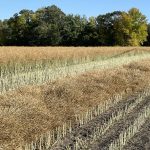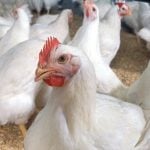A second hog operation in Manitoba has tested positive for the deadly porcine epidemic diarrhea virus.
Manitoba Agriculture announced confirmation May 9, although it said no pigs on the southeastern Manitoba hog finisher farm had shown symptoms of illness.
The provincial veterinarian’s office said the positive sample was found through investigation of another positive sample at a high-traffic site.
The second on-farm case has the province’s hog producers on high alert, said Manitoba Pork chair Karl Kynoch.
“The veterinarians have to do the trace back and trace forward from that farm, and then they’ve got to do more testing on that farm as well, so there’s a lot more questions than answers at the moment, how that farm came in contact with it.”
Read Also

Trade war may create Canadian economic opportunities
Canada’s current tariff woes could open chances for long-term economic growth and a stronger Canadian economy, consultant says — It’s happened before.
Tests at 18 sites with high hog traffic, including assembly yards, slaughter plants and truck washes, have identified eight positive tests among more than 1,180 samples.
Kynoch said some of those sites have already undergone cleaning and disinfection and will be retested to gauge success in virus eradication.
Source of the infection isn’t known, but livestock trucks have always been considered potential carriers, especially those travelling from the United States where PED is now endemic and has killed millions of piglets.
Kynoch said the Canadian Food Inspection Agency and Canadian Border Services tag trucks at the border that have come from American farms.
Those trucks are required to be washed and disinfected at an accredited wash station.
However, regulations don’t require trucks coming from U.S. packing plants to be tagged or washed.
“Those are the most dangerous trailers to our industry because there are such high levels of PED in the U.S.,” he said.
“In Manitoba, we’ve been pushing to get them to do that, but the wheels of government don’t move too fast.”
Kynoch said producers are asking for government action at both the federal and provincial level.
“It’s going at government speed. It’s frustrating. Things that a farmer would implement inside of 24 hours, you’re looking at a year or two to do that with government,” he said.
“Our government is working with us, but I sure wish they would pick up the pace. We have PED on the ground here in Manitoba, and we’re trying to fight it.”
PED spreads easily and is almost always fatal to young piglets, although it is no threat to human health or food safety.
In Canada, 62 hog operations, 58 of them in Ontario, had contracted the virus as of May 12.















